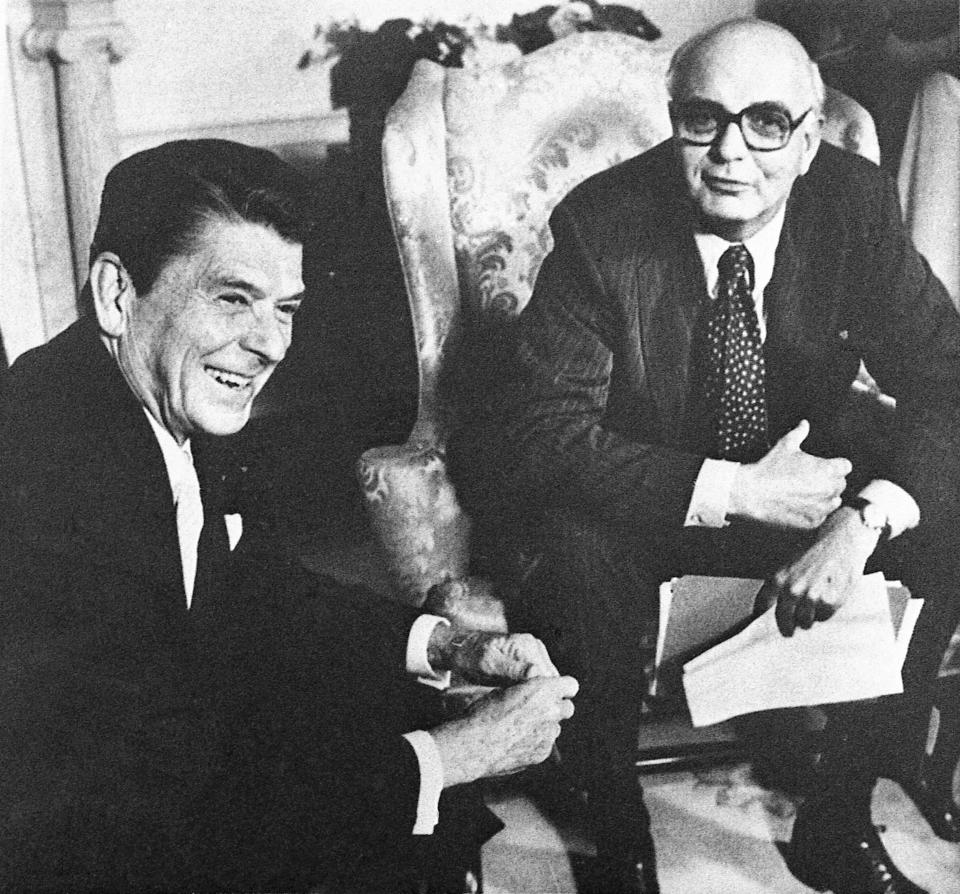Paul Volcker was the Federal Reserve knight who killed inflation
Paul Volcker was a towering figure in Washington. Not just because of his 6-foot-7 frame, but because of a steely personality and gritty determination to vanquish the worst bout of inflation ever to plague the United States.
Volcker, who died Sunday at the age of 92, served as chairman of the Federal Reserve Board from 1979 to 1987 under two presidents — a Democrat and a Republican — who looked to him to steer the nation’s economy away from runaway inflation that peaked at nearly 15% in 1980.
He accomplished that difficult task by pushing interest rates to 20%, which precipitated the steepest downturn at the time since the Great Depression. Unemployment approached 11% during the 1981-82 slump and it wasn’t until 1983 that the country started to regain a healthy economic footing.
As a young reporter at The Associated Press assigned to cover Volcker, I had a close-up view of him and came to admire the traits that produced the kind of public figure we can appreciate: a man of unimpeachable ethics who showed the courage to do the right thing despite the enormous cost to American workers and businesses, and the sharp criticism he had to endure.

Another lesson from that period is the importance of an independent central bank free of political influence. Yes, the country went through several years of deep economic pain, but double-digit inflation also was creating great pain and anxiety. The payoff in retrospect was worth it. We broke the back of inflation and kept it at bay going on four decades.
Fighting inflation, political interference
Ensuring that the Fed serves the public interest free of political interference is especially important today in view of President Trump’s persistent public attacks on current Fed Chairman Jerome Powell to cut interest rates to zero to guarantee a strong economy when Trump seeks re-election next year.
Powell has wisely resisted, knowing too well that prior Fed chairmen who cut interest rates to aid a president’s re-election campaign planted the seeds for reignited inflation and a future recession.
At least, Volcker did not have to deal with attacks from the president on Twitter, as has Powell, or barbs from anonymous detractors on social media platforms. Rather, he encountered protests from struggling farmers who drove tractors around the Federal Reserve’s headquarters building and unemployed construction workers who sent him two-by-fours in the mail.
Volcker, who spent his career as a banker in both the private sector and federal government, was named Fed Chairman by President Jimmy Carter in August 1979 at a time of “stagflation” — sluggish growth and high inflation triggered by the Arab oil embargo first imposed six years earlier.
Volcker felt he had no choice but to choke inflation out of the economy by pushing interest rates into the stratosphere. After Republican Ronald Reagan defeated Carter in the 1980 election, the new president, to his credit, stood by Volcker’s tight-money policy despite the pain to the economy and the political backlash that resulted.
Lower rates, booming economy
Volcker began lowering interest rates in 1982 and by the following year, he could see the success of his tight-money policy, as inflation plummeted, unemployment eased and the economy chugged ahead.
Reagan reappointed Volcker to a second four-year term in 1983, but the central banker revealed in a 2018 memoir that Reagan’s White House chief of staff, James Baker, demanded that Volcker keep interest rates low leading up to the 1984 election. Sound familiar?
Volcker kept that order to himself since he had no plans to raise interest rates given the state of the economy. As it turned out, 1984 was year of great prosperity and Reagan won re-election in a landslide.
Reagan replaced Volcker with Alan Greenspan in 1987. In the last three decades, Volcker served in numerous advisory roles aimed at keeping the global banking system healthy and free of corruption.
He will be remembered most, however, as the knight who slayed the dragon of inflation against all odds. At the time, he was the most powerful non-elected official in the world. It required a man of total integrity and confidence to wield such enormous clout for the betterment of the global economy.
That is why Paul Volcker always will stand tall in my eyes.
Owen Ullmann, a former USA TODAY managing editor, is executive editor of The International Economy magazine.
This article originally appeared on USA TODAY: Federal Reserve Chairman Paul Volcker, appointed by Jimmy Carter

